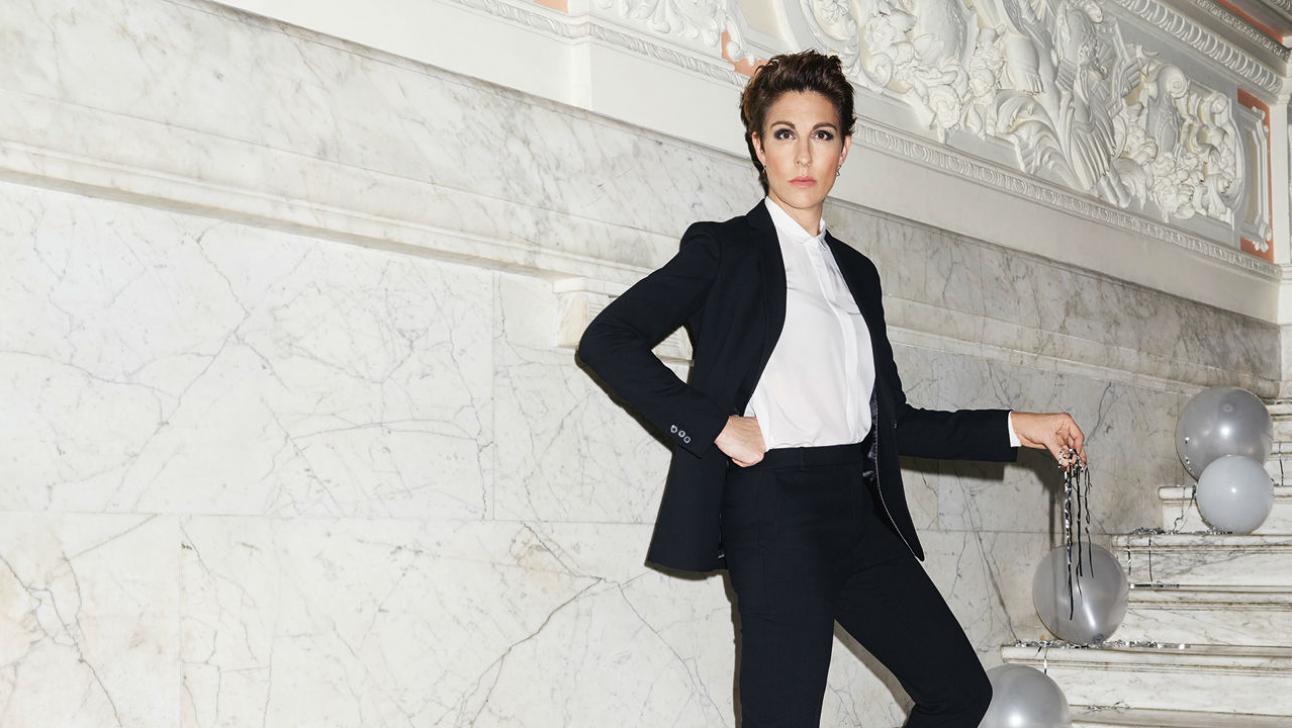
The lights go down and the audience is plunged into the eye of the storm. The sounds of crashing waves fill the Olivier Theatre, rivaling the dramatic music from a live band: Sebastian hangs from the edge of an enormous ship’s bow while the other cast members shout at the top of the towering multipurpose pyramid. Their sounds of distress are quickly drowned out by the revving of engines: a sports car and motor bike drive on stage at a fair lick, accompanied by an energetic middle-aged saxophone player. But the excitement is far from over and the National Theatre’s Twelfth Night starts as it means to go on.
Simon Godwin could hardly be accused of not making the most of this theatre’s famous treasure-trove of tricks. The large structure that sits on stage provides an ever-moving setting and its flexibility allows for the swift changeable nature of a Shakespeare comedy. Especially Twelfth Night, which involves the taking up of so many tropes, characteristics—and in this version gender—which becomes as fluid as the partitioned pyramid that spins on stage. Its changing sides symbolize the miscommunication and changing of identities within the play. It goes from a ship, to a street, to the interior of a lavish apartment fitted with conservatory, plunge pool and fountained garden. The production utterly indulges in the exhibitionist, raucous aspects of the play and we find ourselves caught up in its hedonistic momentum. There are continual references to alcohol and bad behavior, we even end up in a glittering night club watching a flamboyant drag queen performance of ‘to be, or not to be’.
Yes, the decision to turn the male Malvolio into Tamsin Greig’s female Malvolia was an interesting choice, but there were other less noticed elements that made the play what it was. Not to be forgotten was the sheer power of the live band and the wonderful side effect of the reappearing saxophone player who sashayed her way around with her own stand alone character. The sparkling hilarity of each performance had to be noted, especially Phoebe Fox’s Olivia who made a fairly simpering irritating part into an empowered, amusing, and endearing one, showing moments of vulnerability through a guard of prickly dignity.
Greig’s much discussed performance of the newly christened Malvolia was at times unnecessarily overly stated and indulgently eccentric, but the power of her soliloquy and her comedic presence could not be denied. Nor could the ease in which she slipped into a male role, artfully turning the character into an androgynous outsider who stood apart from the other characters’ shenanigans. She matched the plays rollicking boisterousness with pedantic prudishness.
However, the play did not relax and allow these skills and aspects to be enough, and its overstated dramatic ending was unnecessary and in some respects patronizing to the audience. The nature of Shakespeare’s comedies is that everything finishes off too neatly, too much is ignored. One person cannot be in love with someone then easily settle for the twin. One cannot forget a major character’s need for justice after wrongful imprisonment and then allow them to just slope off. The questions of gender and sexuality that were intelligently raised in this version cannot so quickly be put to bed by wedding off characters to their ‘correct counterparts’.
The production does not allow for the subtle undertones to shine through or trust the audience to notice these anomalies. Instead we watched a sorrowful, bitter, and—after a bizarre removal of her wig—suddenly blonde Malvolia climb a tower into the sky which fell with rain in an over emotive, overly serious finale that was not necessary.
Despite this being a shame, the high-notes outshone the low, and I shall not forget the hilarious alternate twist of Shakespeare’s most famous soliloquy being performed by a drag queen in platforms or Olivia’s snippy tone and insistence that the men in her life don a pair of speedos. While I shall try and forget Greig’s doleful ascent into the rain, her descent of the same staircase in yellow, cross gartered stockings in a marvelous, awkwardly forced striptease should always be remembered when one thinks of Twelfth Night.
Twelfth Night runs at the National Theatre until 13 May 2017.
Filed under: Theatre & Dance

Comments